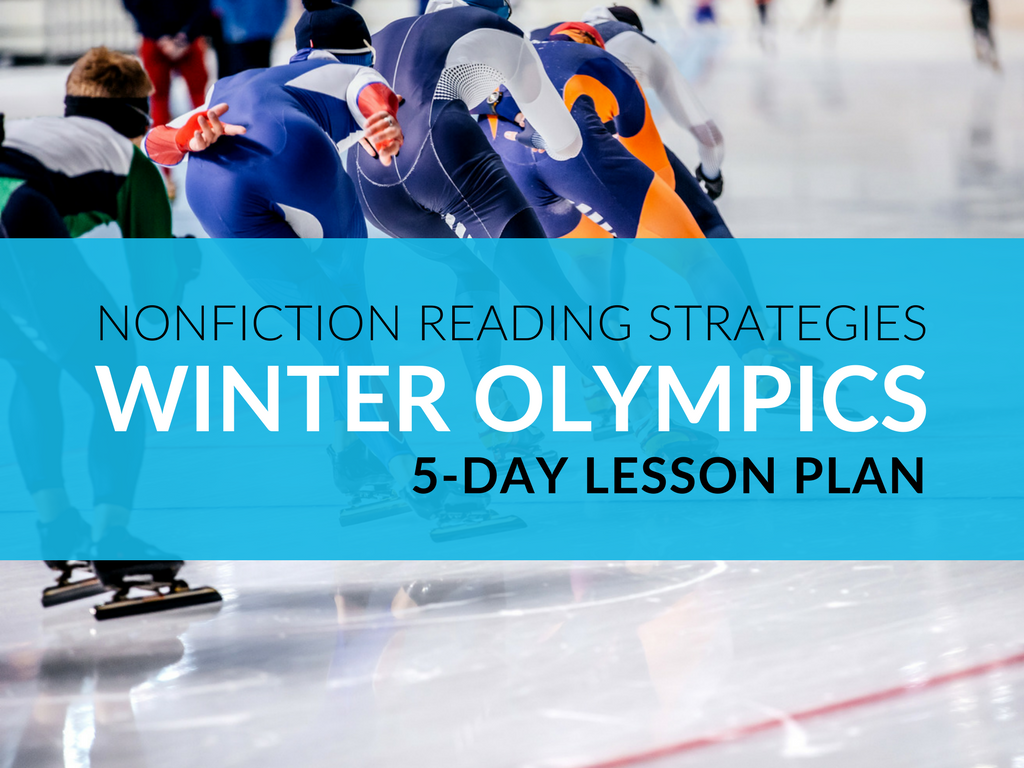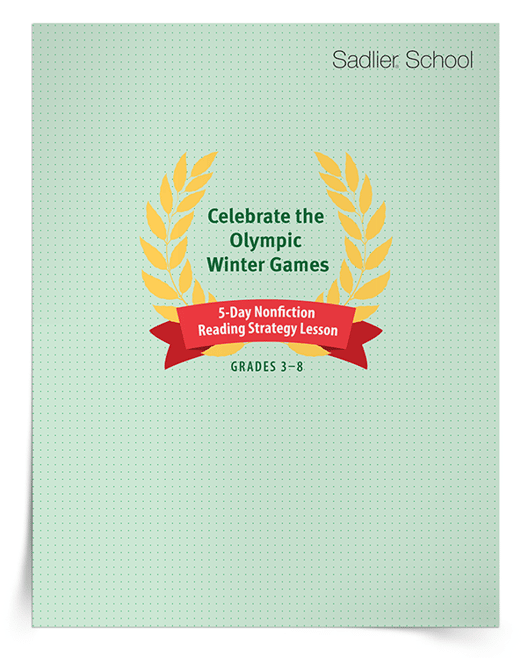January 23, 2018 CL Seasonal Activities Winter, CL Lesson Plans, ELA Seasonal - Winter, ELA K-5, ELA Focus - Reading, ELA 6-8, ELA Resources - Activities, Core Literacy
Winter Olympics 5-Day Nonfiction Reading Strategy Lesson Plan, Grades 3–8
By: Erin Lynch
Use the 2018 Winter Olympics to engage students in a series of nonfiction reading strategy lessons! Use the lessons and printables below to teach (or review) nonfiction reading strategies in grades 3–8 classrooms.
Download the Olympic Winter Games Reading Kit now!
Free 5-Day Nonfiction Reading Strategy Lesson for Grades 3–8
MOTIVATE STUDENTS TO READ WITH THE WINTER OLYMPIC GAMES
The thrill of watching winter Olympic athletes go for the gold is something I look forward to every four years! My students are so excited for the 2018 Winter Olympic Games, that I thought I would build on that enthusiasm with a series of nonfiction strategy lessons based on the Olympics. I strongly believe learning resonates more when my students are reading about topics of high interest to them.
Before jumping into the Winter Olympics Lesson Plan I've outlined below, share a bit of background information about the 2018 games to get students motivated:
The 2018 Winter Olympics will be held in Pyeongchang in South Korea. This will be the first time South Korea has hosted a Winter Olympics (Seoul hosted the 1988 Summer Olympics). Most of the events will be held at Alpensia Sports Park, home of the Alpensia Resort. This year's Olympic games will begin on February 8, 2018, and end February 25, 2018. The games’ Opening Ceremony will take place on Friday, February 9, but the first competitive events start will on February 8.
The Winter Olympics includes 15 sports with both individual and team events. There will be 102 events for athletes to earn medals. Many sports are held on the ice including: curling, bobsled, figure skating, hockey, luge, short track, skeleton and speed skating. With the rest of the events taking place on the slopes: alpine skiing, biathlon, cross-country skiing, freestyle skiing, Nordic combined, ski jumping and snowboard. (source)
HOW TO USE THE WINTER OLYMPICS LESSON PLAN
Using the following lessons teachers will help students construct meaning out of nonfiction texts. To assist teachers in implementing the nonfiction reading strategy lessons below, I've compiled all of the Winter Olympic lesson plan resources into a free downloadable kit. This kit includes a week’s worth of nonfiction reading strategies, instructional plans, reading material suggestions, and graphic organizers that coincide with each lesson.
Before you begin, you will need to gather articles to coincide with the lessons and instructional strategies below. Once you read an overview of the lessons in this kit, the official website for the 2018 Winter Olympics, www.Olympic.org/pyeongchang-2018, will help get you started finding appropriate articles.
Here is an overview of how to use the materials:
DAY 1: READING WITH A PURPOSE
Connected Reading: Students will need an article about Shaun White
Support Material: Who is Shaun White? Chart (provided in kit)
Tell students that sometimes it is helpful to read a text with a question in mind; it makes the act of reading more purposeful.
Give each student a copy of the Who is Shaun White? Chart (provided in kit). Explain to students that they will individually read an article about the very popular snowboarder and Olympian, Shaun White. Prior to reading, they will review the questions on the Who is Shaun White? Chart and use the questions to give them purpose and direction as they read and research. After they read, have student write their answers to the text-dependent question and provide evidence.
DAY 2: ORGANIZING NONFICTION INFORMATION
Connected Reading: Students will need an Olympic-themed article about an issue, person, or event
Support Material: Summary Chart (provided in kit)
Students can show their understanding of a text by summarizing. A summary of any text should include only significant information and leave out unimportant details. Summarizing requires students to use evidence to support their ideas. After reading the article selected, have students summarize the text using the Summary Chart (provided in kit).
Students will summarize what they read using the Summary Chart. Model for the students how to use a Summary Chart using only important details. Then have them practice with another article independently.
DAY 3: DETERMINING MAIN IDEA UTILIZING TEXT FEATURES
Connected Reading: Students will need an Olympic-themed article
Support Material: Main Idea and Supporting Details Chart (provided in kit)
Explain to the students that a good way to determine the main idea after they have read a text is to use the title, subtitle, and introduction as a guide. To identify the most important details of a text, text features can be very helpful, especially the headings. Discuss with students how organizing information about a nonfiction text can help them to recognize the main idea and the most important supporting details.
Introduce and model how to use the Main Idea and Supporting Details Chart with your students. Have them read another article independently and practice determining the main idea and identifying the supporting details with this chart.
DAY 4: RESEARCHING FOR A PURPOSE
Connected Reading: Students will need access to informational articles and schedules about Olympic events
Support Material: Events of the Winter Olympic Games Chart (provided in kit)
Explain that when researching a topic such as the Winter Olympics, it can be productive to work as a team. By collaborating on a research topic more information can be found at a faster rate than if one student was working independently.
Tell students that today they will be researching some of the different events taking place at the Winter Olympics. The events to be researched will be divided amongst your students (individually, in pairs, or small groups). Students will record notes about their assigned events on Events of the Winter Olympic Games Chart (provided in kit).
DAY 5: INQUIRY BASED RESEARCH
Connected Reading: Students will need to choose three articles they find interesting from www.Olympic.org
Support Material: In Olympic News...Chart (provided in kit)
Discuss with the students how often when researching a topic as vast as the Winter Olympics, one question might lead to another question. New information gained might spark other inquiries.
Allow your students to research any lingering questions or areas of interest they have about the Winter Olympics. Using the In Olympic News… Chart (provided in kit), students will select three articles from the official Olympic website (www.Olympic.org) that they find interesting and record detailed notes about the main idea and why the topic is newsworthy.
IN SUMMARY
Nonfiction reading strategies help students construct meaning out of nonfiction texts. Celebrate the XXIII Olympic Winter Games and download a free bundle of nonfiction reading strategy lessons and reproducible handouts for grades 3–8 now.





